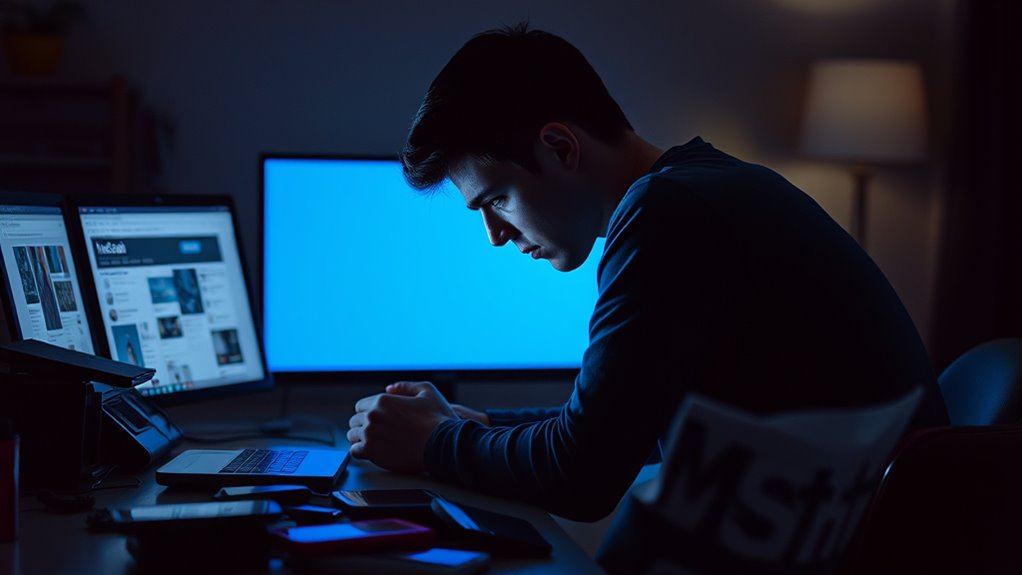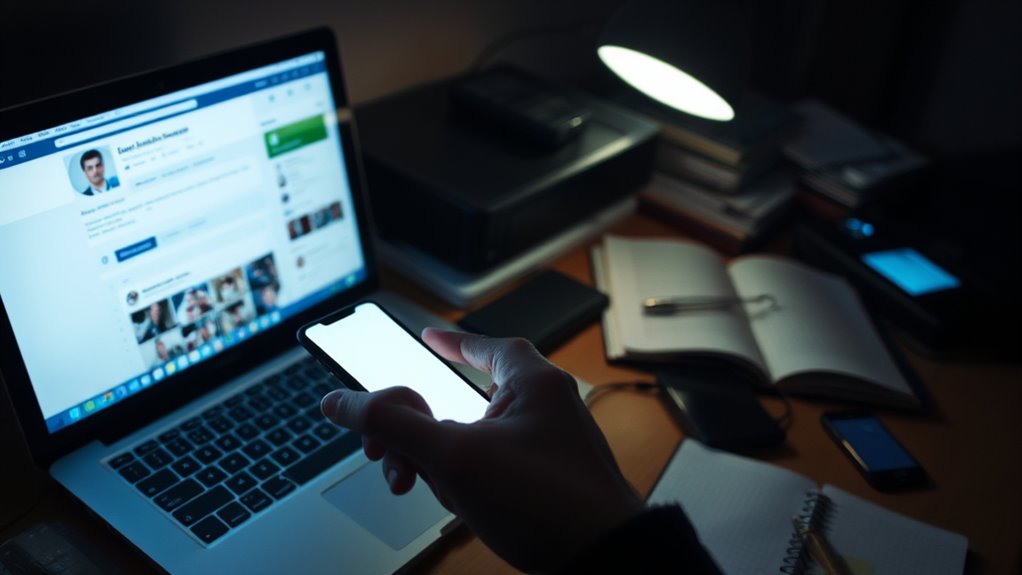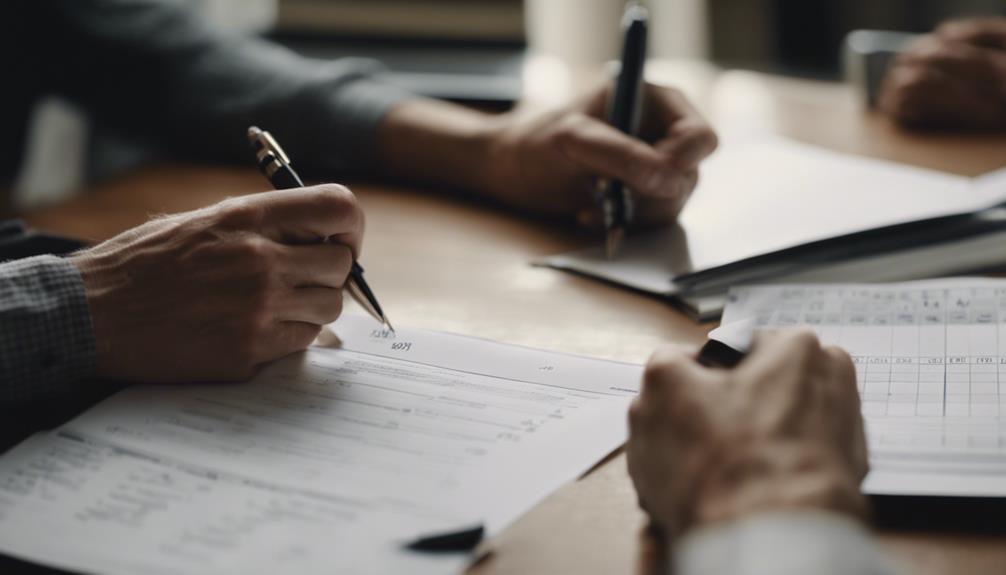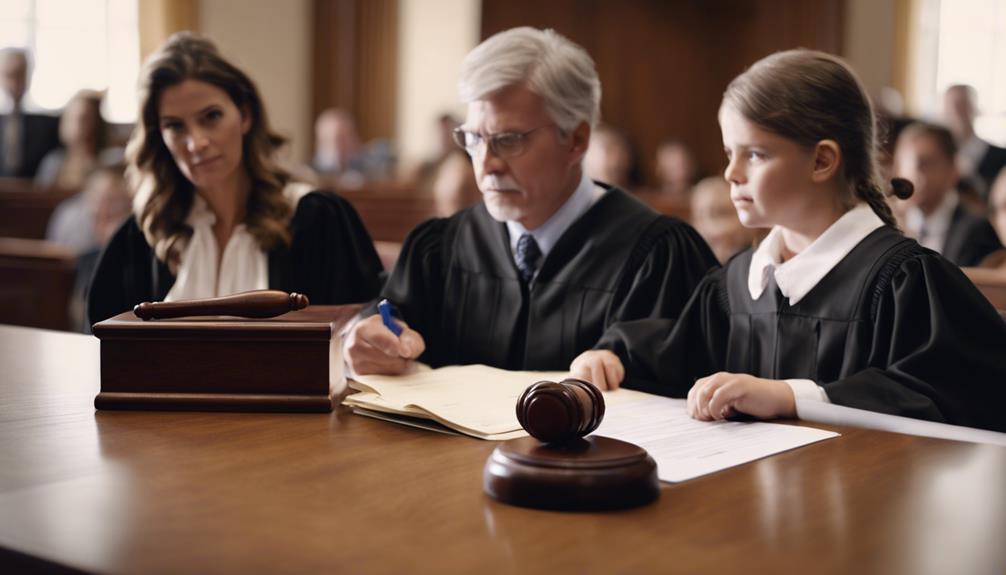Social media stalking lets someone easily access your personal info, eroding your privacy and putting you at risk of real-life dangers. It can cause emotional distress, paranoia, and feelings of helplessness as your personal details are often exposed without your consent. This digital control can lead to stalking, harassment, or even threats that carry serious consequences outside the online world. Staying aware and proactive can help protect you—discover more ways to stay safe as you explore further.
Key Takeaways
- Social media enables easy access to personal information, increasing vulnerability to stalking and privacy violations.
- Digital monitoring can lead to psychological distress, paranoia, and social withdrawal.
- Loss of control over personal data fosters feelings of helplessness and anxiety.
- Obsessive online tracking can escalate into real-world harassment and threats.
- Awareness and privacy controls are vital to protect oneself from online and offline dangers.

Have you ever wondered just how easy it is to keep tabs on someone through social media? With a few clicks, you can access a wealth of personal information—photos, locations, daily routines—that once would have required much more effort to uncover. This accessibility might seem harmless at first, but it opens the door to serious privacy violations. When someone stalks your online presence, they can gather details you never intended to share publicly, often without your knowledge or consent. This invasion of privacy can make you feel exposed and vulnerable, knowing that your personal life is being scrutinized without your permission. The more someone monitors your social media activity, the more it erodes your sense of control over your own information, leading to feelings of helplessness and anxiety.
Monitoring your social media can expose personal details you never intended to share.
The psychological impact of social media stalking isn’t just about privacy; it can be deeply distressing. Constantly worrying about who’s watching or what they might do with your information can cause significant mental strain. You might start to second-guess every post, every comment, or even your online presence altogether. This ongoing stress can lead to feelings of paranoia, fear, and insecurity, affecting your overall mental health. Many people experience a sense of intrusion that spills over into their real lives, making it difficult to relax or feel safe, both online and offline. In some cases, the psychological toll becomes so overwhelming that it impacts daily functioning, leading to social withdrawal or even depression. Additionally, the manipulation of your personal data through privacy violations can further intensify these feelings of vulnerability.
Social media stalking also blurs the line between online and real-world safety. When someone obsessively follows your digital footprint, they might attempt to track your physical whereabouts, escalate harassment, or even threaten your safety. This constant threat amplifies the psychological impact, intensifying feelings of vulnerability. What’s more, the digital trail left behind—comments, likes, shared content—can be used against you or manipulated in harmful ways. People sometimes underestimate how quickly online actions can spiral into real-world consequences, especially when privacy violations go unchecked.
In essence, social media stalking isn’t just about privacy; it’s about the profound psychological effects it can have. It chips away at your sense of security, mental peace, and personal boundaries. Recognizing the dangers is the first step toward protecting yourself—by setting strict privacy controls, being cautious about what you share, and staying alert to signs of unwanted attention. Remember, your online space should be a safe zone, not a source of constant worry or fear.
Frequently Asked Questions
How Can Victims Legally Protect Themselves From Social Media Stalking?
If you’re being stalked on social media, you can take legal remedies like filing a police report or seeking a restraining order. Privacy measures also help; you should tighten your account settings, block the stalker, and document all interactions. These steps can help protect your safety and privacy. Remember, acting quickly is vital, and consulting a legal professional can guide you on the best course of action.
What Are the Psychological Effects of Social Media Stalking on Victims?
You might experience emotional trauma and heightened anxiety disorders when you’re targeted by social media stalking. The constant invasion of your privacy can make you feel unsafe, helpless, and paranoid. You may struggle with trust issues and experience difficulty sleeping or concentrating. These psychological effects can persist long after the stalking stops, impacting your daily life and mental health. Recognizing these impacts is essential to seeking support and recovery.
How Do Stalkers Typically Gain Access to Private Social Media Information?
Stalkers often access private social media information through privacy breaches or by creating fake profiles. They might hack accounts, exploit weak passwords, or use social engineering tactics to bypass privacy settings. Fake profiles allow them to connect without revealing their true identity. By doing so, they gather personal details, monitor activities, and stay hidden, making it easier to intrude on your privacy and maintain control over your online presence.
Are There Specific Warning Signs Indicating Someone Is Stalking Online?
Imagine a shadow lurking behind your digital curtain. You might notice suspicious activity like unrecognized comments, frequent messages, or sudden privacy breaches. These signs act like silent alarms, hinting someone’s watching too closely. Stay alert for these warning signs, as they often indicate stalking. Recognizing the symbols of intrusion helps you protect your online sanctuary from unwelcome eyes and preserve your privacy.
What Role Do Social Media Platforms Play in Preventing Stalking Behaviors?
Social media platforms play a crucial role in preventing stalking behaviors by enforcing strict privacy policies and active user monitoring. You should be aware that these platforms track suspicious activities and provide tools to block or report stalkers. They also promote privacy settings, helping you control who sees your content. By maintaining vigilant monitoring and empowering users with privacy controls, social media platforms can greatly reduce online stalking and protect your digital safety.
Conclusion
Remember, every click and scroll gives you a glimpse into someone’s life, but don’t let curiosity turn into obsession. Social media stalking is like standing too close to a fire—you might get burned without even realizing it. Stay aware of the digital shadows you cast and respect boundaries, because what’s behind the screen can have real-world consequences that last longer than a fleeting post. Protect your privacy before it’s too late—your future self will thank you.










